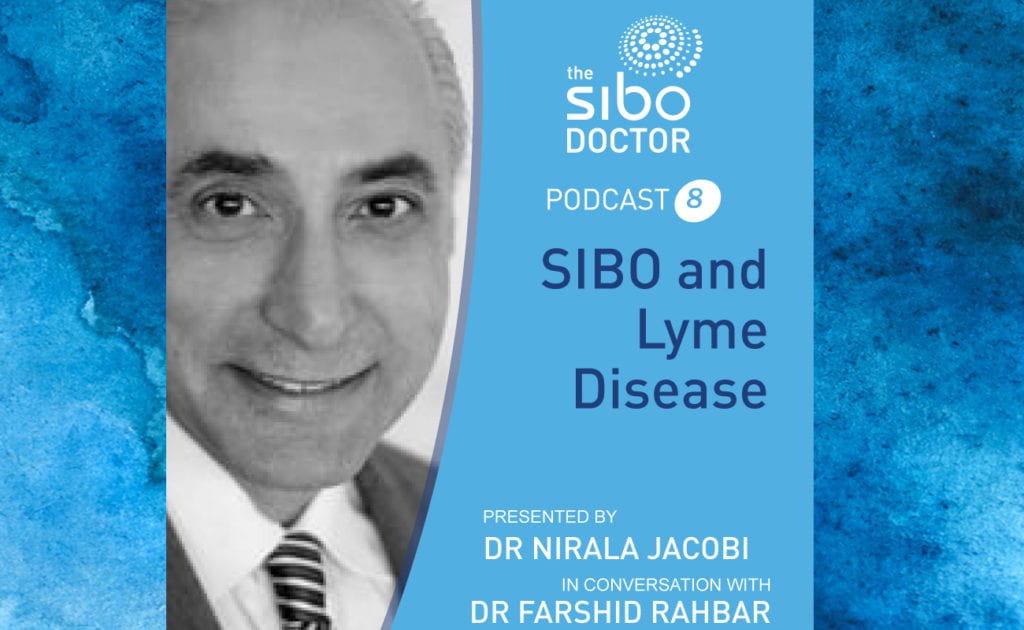Dr Farshid Rahbar, holistic and integrative gastroenterologist in Los Angeles, joins Dr Nirala Jacobi today to speak about Lyme disease and Tick Borne Disease (TBD) in relation to SIBO and other digestive disorders.
Dr Rahbar is the medical director at the LA Integrative Gastroenterology. In 2007, he completed the integrated medicine training, achieving ABIHM status. Dr Rahbar also undertook training in anti-aging, functional, and regenerative medicine, achieving board certification through A4M. He then completed further training through IFM – The Institute for Functional Medicine, and ILADs training.
In 2013 he delved into the relationship between tick borne Lyme disease with a special interest in gastrointestinal (GI) manifestations. Since this time he has witnessed clinical patterns involving the role of infections, acute and chronic, in causing ongoing GI related conditions and symptoms.
Dr Rahbar’s special interest areas include dysbiosis, SIBO, leaky gut, and measures that help these conditions. Like many other experts, he believes that GI integrity is crucial to the treatment of Lyme. Further, both Dr Rahbar and Dr Jacobi recently presented at the 2017 Integrative SIBO Conference held in Lombard, Illinois.
In this episode:
– How Dr Rahbar got into the field of integrative gastroenterology with a specialty in Lyme.
– An overview of what Lyme disease is.
– Tick Borne Disease (TBD) and how borreliosis is one amongst many possible infections.
– Testing for Lyme and TBD and the political discord surrounding this.
– Unexplainable chronic inflammatory conditions and how they may require testing for TBD.
– What are the core clinical presentations of Lyme and co-infections that Dr Rahbar sees in his practice?
– Key presenting components that may indicate TBD – such as fatigue, and neurological dysfunction.
– Anxiety, medical marijuana use, and body aches in young people, and how these may indicate chronic inflammation and warrant TBD investigation.
– Autoimmunity and how Bartonella infection can be implicated.
– What is the connection between Lyme and SIBO?
– SIBO as a phenotypic presentation of underlying TBD infection.
– Testing options for Lyme and coinfections and how accurate these are, and options for referral to experts.
– Mould, mycotoxicity, and chronic inflammatory response syndrome (CIRS) and how presentations for this can be similar to TBD infections, and chronic immune compromisation.
– How lifestyle factors and certain genetic profiles can increase risk factors and susceptibility to TBD, CIRS, and immune conditions.
– Speculation on nose cultures indicating the possibility of post nasal drip at night, with concomitant hypochlorhydria and/or immune dysregulation, being a risk factor for dysbiosis and SIBO.
– Lyme, mycotoxicity, stealth infections, and the theory that the chronic immune issues and how the microbiome decimation of the last 50 years can be impacting the ability to regain health.
– High methane levels in Lyme patients and how this can be related to immune suppression.
– Dysautonomia and small fibre neuropathy in the stomach itself, and the relationship to Lyme.
– GERD as a risk factor for SIBO.
– The lower esophageal sphincter (LES) and why dysfunction may occur when the autonomic nervous system is affected.
– The constellation of autonomic neuropathy, dysbiosis, pyloric valve insufficiency, and bile reflux and how any and all of these may lead to GERD.
– How is dysautonomia diagnosed, and is it only related to Lyme, TBD, and coinfections?
– Gastroparesis and how it may be related to dysautonomia, Lyme, and other TBD.
– Inflammatory cytokine release and how this cascade may relax the LES and contribute to SIBO.
– The tightness of the fundus and how it could contribute to reflux oesophagitis.
– Methane dominant SIBO and retrograde motility leading to symptoms such as burping, and nausea.
– Dr Rahbar’s clinical pearls for SIBO patients.
– Dr Rahbar’s phases for SIBO treatment:
– Preparatory phase
– Attack phase
– The place of nystatin in lower bowel dysbiosis and fungal overgrowth.
– Biofilm disruptors for TBDs.
Resources
- Dr Farshid Rahbar
- Dr Shoemaker
- Mould literacy website for patients and physicians – Surviving Mold.
- Dr Scarpignato
- Frank Netter
- Nutraceuticals

